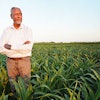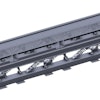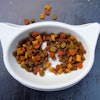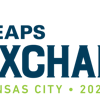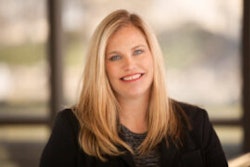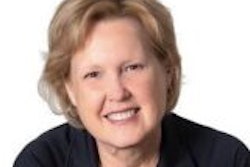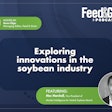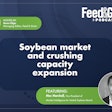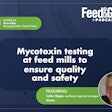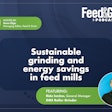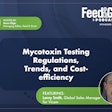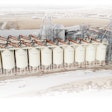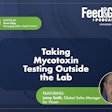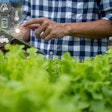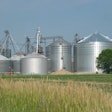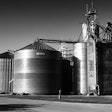
Steven Kilger, the managing editor for Feed & Grain and host of theFeed & Grain Podcast, talks with students Carter Minson and Garrett Freson fromKansas State University's Grain Scienceprogram.
Topics include:
- What drew them to study for a career in the feed manufacturing industry
- How is their education going
- The hands-on experiences they've had making feed
- What are their hopes for their future careers in feed
Transcript:
Steven Kilger:00:02
Hi everyone. My name is Steven Kilger, managing editor for Feed & Grain and host of the Feed & Grain podcast. We have a special episode today; I got a chance to talk with some students from Kansas State University's Grain Science Department on the show floor IPPE this year. The audio is maybe a tad rough during some parts, but better than you think. And my guests, Carter Minson and Garrett Freson were just great to talk to you. We discussed why they took an interest in the feed industry, their experience getting an education in grain science, and what they're looking forward to in their future careers. I recorded a couple of these interviews during the show with some other students from KSU. And I'll be releasing those slowly in the coming months.
Before we get to those interviews. A little bit of housekeeping. If you're listening to this podcast within a podcast app, please consider subscribing and or leaving a review. If you have an idea for a topic you would like me to cover or someone in the animal feed, grain handling or related industries, you think I should talk to you, let me know. This podcasts page on feedandgrain.com has a button right under the title that will allow you to send an email directly to me. I'd love to hear from you about anything. So please drop me a line. Now enough of that. Onto the conversation itself.
Who wouldn't mind just first and last name telling me who you are?
Carter Minson:01:23
Yeah, Carter Minson. From Western Kansas, I grew up in a small town. I wasn't really ever involved with feed production, had a couple of animals, livestock show the pigs growing up for a couple of years. Kind of led me to know I wanted to go to K-state, knew I wanted to do something within animal production but wasn't really sure what bound feed science and enjoyed the last three years I’ve been there. It's been good.
Kilger:01:49
What made feed science stand out for you.
Minson:01:52
I think some of it was just the production all the equipment, I knew I really didn't want to work. I mean, feed production is a live animal side. But it's not like in the barn every day with that kind of stuff. So, it's just an avenue. Never really wanted to be a nutritionist when I was growing up, but kind of got some interest in that now. So there's just a lot of different avenues that sparked my interest a little bit, but a lot of it's just the operation and how all the equipment works. Things happen. There's a science that ties into it. I didn't realize this until I started doing a little bit of my own undergrad research.
Kilger:02:23
是的。Do you have experience with it before you go to the feed mill when you were young? Do that kind of thing?
Minson:02:29
No, not really, not really at all. There are a couple of guys back home that have degrees in feed science, and I didn't even were family friends. I don't even know they had that degree until like last year. Now. It's good. I enjoy it. There are a lot of opportunities. It seems like.
Kilger:02:41
You're going to go for your masters, and you're planning on staying in K-State you use thinking masters and feed science, right now? Are you going to go into the nutrition side of things.
Minson:02:49
We're going to get a master’s. It's a master's in grain science, but it's going to be with our feed science professors, hopefully, do a lot of operations research. I'll do some nutrition research, too.
Kilger:02:59
是的,你考虑过谷物升降机的男人agement, that kind of things?
Minson:03:04
I'm not really sure I want to do that. I think I want to do more making feed rather than with commodities. They're all tied together.
Kilger:03:10
But yeah, but I mean, it's different. I mean, there's a little more science behind are you thinking you want to go into the actual science route, the management route?
Minson:03:17
Thinking like the service tech, like operations, service tech type stuff, and do some research. So, there are a lot of things going to happen in a couple of years present themselves.
Kilger:03:28
You have a lot of opportunities. Still, you do get to thinking about internships, anything like that?
Minson:03:33
Yes, I'm at two different internships. I worked for a cattle producer two years ago in the panhandle of Texas. And then, I worked for a poultry production company last summer.
Kilger:03:44
Who do you work for?
Minson:03:45
I work for Cobb. Oh, yeah, that's the mill in Siloam Springs last summer.
Kilger:03:51
Awesome. And you liked it, you will actually gotten the feed mill, and you're like, Yeah, this is still for me?
Minson:03:56
Oh, yeah, it was good. It was pretty much every day; I learned all the different jobs within the feed mill. And then I learned some managerial stuff, which was nice.
Kilger:04:06
是的。And that's it. It'll help you no matter what side of the industry you go into, right? Eventually go into more of a nutrition bed, knowing how a feed mill actually works. It's a big hill. Yeah. So how are you liking the show? Is this your first one?
Minson:是的。First of all, yeah, it's huge.
Kilger:And most of its poultry production and stuff, though. So, the feed side is a little smaller.
Minson:04:34
We got to go out and talk to some people who stopped by equipment manufacturers, and we've been seeing what's new out there. Yeah. So, we've stopped by some of the equipment that we have in the feed mill. So, RMS, with the roller mills, stopped by them. They have an indirect drive roller mill which is cool. So, stop by CPM. We run CPM pellet mills in Mill, so just a lot of the equipment that's familiar already seeing those people sending people we know some ingredient suppliers.
Kilger:04:55
So well, because guess you work in the KSU feed mill, right?
Minson:04:58
So we have a full-scale feed mill. Everything’s pretty much what you'll see in the industry and maybe a little bit smaller, but very similar. I've worked there for the last two years. Yeah. Nice. I do that when I'm not in class.
Kilger:05:22
So like, what would you say to your people your same age and why they should kind of get into feed production, animal feed production?
Minson:05:34
I just think there are so many opportunities that go along with it. I don't even think I think a lot of kids think you had to have raised animals growing up to be a part of it. I'm a kid that didn't raise animals growing up. I didn't grow up on a farm. So, it just goes to show. You can learn stuff if you're willing to branch out. Yeah. Take opportunities. People are willing to help. It's a small world in the food industry. And once you get to branch out a little bit, while you're
Kilger:06:01
A lot of people like living in small towns, in rural America, and this is one of the big job opportunities in that kind of area. Are you looking forward to that? Are you planning on going back to your home area? Where are you from?
Minson:06:14
Western Kansas.
Kilger:06:15
Do you plan on going back to western Kansas when you graduate, or are you are just wherever the job takes me?
Minson:06:21
I like to have a job at some point where I could travel a little bit. Yeah, I mean, we'll see where it ends up.
Kilger:06:27
And thank you for agreeing to talk. Say your name. First. And last name.
Garrett Freson:06:35
Garrett Freson.
Kilger:06:37
Garrett, nice to see you. Nice to meet you. How are you? I am doing all right. How are you? How are you enjoying the trade show? Good. This is your first one.
Freson:06:48
We’re all new people. I don't know if any of us have been.
Kilger:06:50
Is it what you expected?
Freson:06:52
The tradeshow part is definitely more than what I expected. It's pretty cool. We did some presentations to research. So that was kind of fun. What are you researching? We've done a lot of different stuff. So, we have one on food waste use in poultry diets, we to myself and one other students, did use of a new a newer grain that hasn't really been used in feed. So, there's some research there. And then there was some on just the pelleting process. Efficiency.
Kilger:07:23
So yeah, that's kind of the fun part of being while you're graduate student.
Freson:07:28
I'm an undergrad.
Kilger:07:29
Oh, nice. Are you planning on getting your masters in the industry?
Freson:07:33
Yes, I've got about a semester left, hopefully start in the summer. Nice. That's my plan. Anyway.
Kilger:07:37
So good plan. The big question is, what's your background? What kind of drew you into wanting to study feed science.
Freson:07:43
So, I'm from Indiana. And then we showed livestock, mainly sheep, it was kind of what we did still ratio. And then my dad and my mom both have a background in animal science, nutrition, food science. So that was kind of where it all started. And then with the production side of us raising our own animals, one of my biggest interests was always nutrition, and you know how that affects him. But then I didn't learn about feed science until coming to visit Kansas State and looking around. And that was one of the things, but that kind of led me to that I'd say.
Kilger:08:19
Something you don't think about, right? Was it a class, or did you just pick it up?
Freson:08:23
So, I risked it and moved from Indiana to Kansas, hoping that I like feed science. And luckily, it's, it's great, I really enjoy it. But one of the things that really, when I was starting to think of where I wanted to go to get us warmed up they give you some facts about the feed industry in a grain science industry. And it's just the stability of jobs. They've told us that you can get 3, 4, or 5 job offers, and you get to pick so stuff like that kind of attracts you. And then you get into it and try it out, learn about the science and in the process. And it's just interesting how all that works.
Kilger:09:03
Yeah, well, it sounds like working in a feed mill kind of interests you about it. Animal Nutrition, obviously. But you could be a nutritionist. Are you planning on doing that? Are you planning on going to the kind of actual management? What's your current goal?
Freson:09:17
I thought about a Ph.D. in nutrition, but I don't know if I'll go that route. What I'm thinking about more is a tech service type of position. So, getting into a little bit of the office work, if you will, but then also the ability to go to the feed mill to the plant and solve a problem or figure out what's going wrong with their quality or your chain or something. So that's kind of why I like being in the feed mill. So, I like the nutrition side of things, but it's always something different. Yeah, so you go in and being able to go through and try to figure out what's wrong it that's kind of an interesting aspect of things.
Kilger:09:55
Nice. Have you had any internships, or anything like that so far?
Freson:10:00
我做了一个实习与国家家庭农场. They're an integrated swine farm. And it's in Hagerstown, Indiana where I did that it. So, I worked for them, summer and then I went back in the winter over our Christmas break while I was home and worked for him. And so, a lot of SOP training, and then rewrites is something I worked on the first time. And then also we went through, and they, they wanted me to update their quality control program. So that was something I got to do and went back and forth between what I learned in college and then trying to implement that to a male that's going to hopefully use all that.
Kilger:10:39
I mean, you've already got that. That’s a huge experience right off the bat. Hmm. This is a draw of kind of being able; you’re able to move pretty much anywhere you want from the Midwest, at least the Midwest and Southern corn belt and all that. Right. When you is that part of the appeal, are you planning on going back to Indiana?
Freson:10:59
希望我回到印第安纳州。这是一种goal for me. But for some people, the fact that you can kind of pick and choose where you want to go. And if you're willing to, you could go work in every state in the country if you really wanted to. So yeah, I can definitely see why that would be an appeal for some people
Kilger:11:19
Work almost anywhere in the world if you really want to do Oh, yeah, there are a lot of opportunities. And are you working in the Kansas State University feed mill?
Freson:11:27
Yes, I've worked there. Three years now, I believe, and Carter and myself are trying to learn some of the operations. And then we've got Julia, Ashley, and Nathaniel. So, we've got about five of us that work there. And we're just learning. We're in between management. And then we've also got our research coordinator, that'll be on a lead here soon. So, we're trying to all learn together so that we can keep it running. So, we don't shut anything down again. But
Kilger:11:54
Yeah, it's interesting. If you found that hands-on experience valuable,
Freson:11:59
绝对的。是的。能够学习的the classroom. But then, since we weren't there, we get to go and then do it hands-on. It's typically it's up to us to do it. So having that hands-on, but also the responsibility of that helps you learn what you're doing.
Kilger:12:17
Have you gotten to go to any of the feed education programs here? At the show yet?
Freson:12:22
No, I didn't get to do any of the, trainings or anything like that. We did a lot of the science presentations. We looked at a lot of that. So that was kind of an interesting part of the show. Yeah.
Kilger:12:33
Are you getting to go around and visit vendors?
Freson:12:37
Oh, yeah, we've been walking around pillows all day. You get to talk to people. So that's fun.
Kilger:12:41
Everyone was friendly.
Freson:12:43
Oh, yeah. Oh, yeah, everybody. Yeah. We're learning anything from enzymes to new equipment and are coming out with a lot of interesting stuff.
Kilger:12:53
Well, that's one of the big advantages of the industry I think it's a pretty friendly industry. Oh, yeah. Overall. Yeah. And it's, it's small, it's tight. And so, you see the same people year after year and eventually become pretty good friends with them, I used to work for the American Farm Bureau Federation. But when you go to that kind of production agriculture, it gets so much bigger. Oh, yeah. It's nice to just have a feed which is just a small little, small world of itself. Well, I think that's all the questions I have for you today. Great.
Kilger:
Hi, everyone. It's Steven again. I forgot to record an outro on the show floor. I just want to thank Carter and Garrett for talking with me. And you of course, for listening. I hope you enjoyed the podcast, and I hope you'll be back the next day safe.

